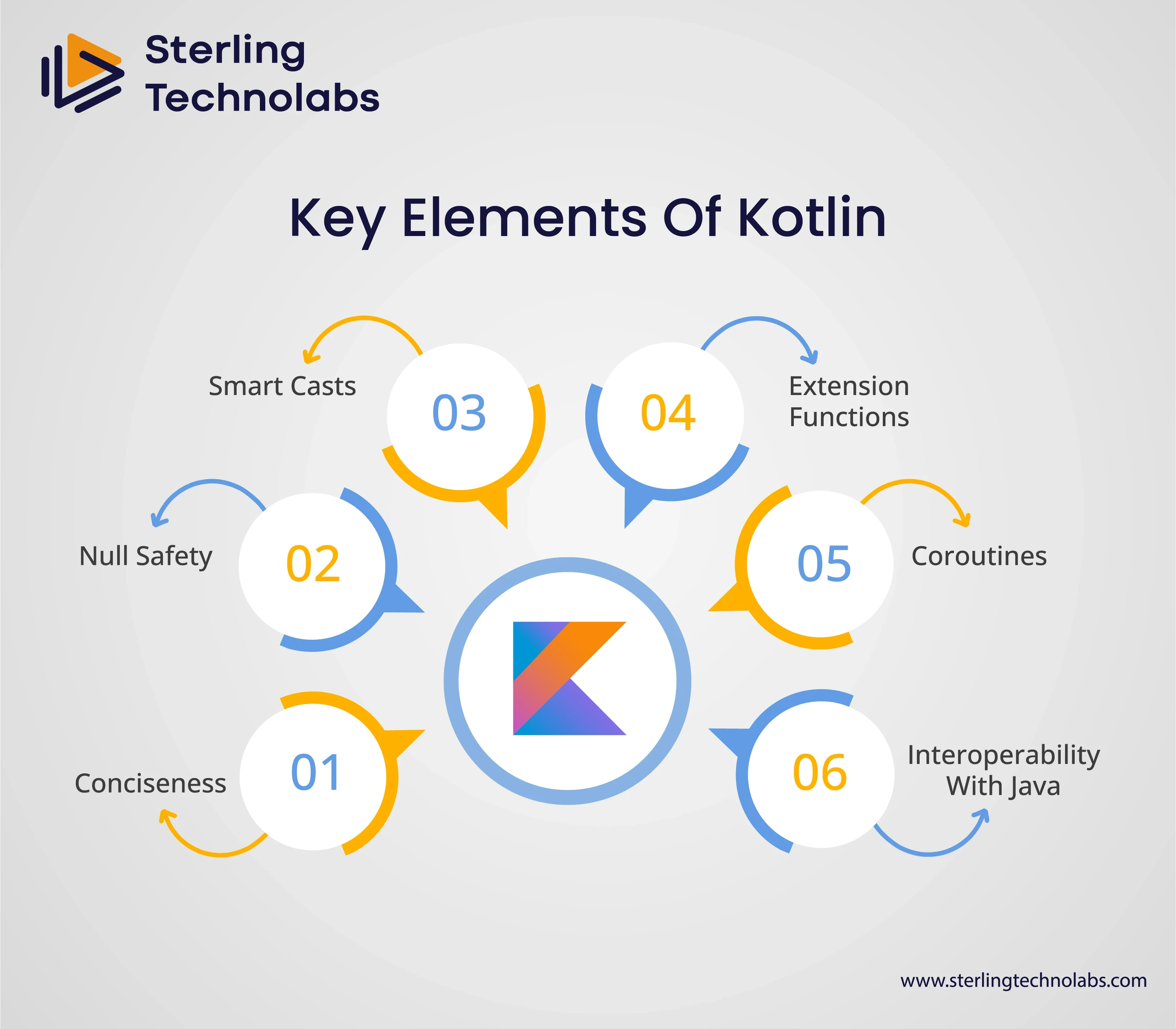
Kotlin altogether upgrades application execution and security through its cutting edge highlights and plan standards. As a statically composed language, Kotlin lessens runtime mistakes by getting issues at incorporate time, prompting more steady and solid applications. This forestall crashes and generally improves execution.
Kotlin's interoperability with Java permits engineers to utilize existing Java libraries while composing cleaner, more succinct code. This lessens the codebase size and intricacy, making the application more effective and simpler to keep up with. Kotlin's high level language highlights, for example, inline capabilities, assist with decreasing above by wiping out the requirement for making superfluous items or summoning extra strategies, which streamlines runtime execution.
The Development of Kotlin:
Kotlin is a statically-composed programming language created by a group of specialists determined to make a cutting edge, more effective option in contrast to Java. It runs on the Java Virtual Machine (JVM) and is completely interoperable with Java, implying that it can call Java code as well as the other way around with no issues. This interoperability has made it simpler for engineers to embrace Kotlin, as they can consistently incorporate it into existing Java-based projects.
Key Elements of Kotlin:
Kotlin accompanies a large group of highlights that make it alluring for Android development. These highlights improve the designer experience as well as add to additional hearty and viable applications.

Conciseness:
One of Kotlin's most celebrated highlights is its brevity. It permits designers to compose less code while accomplishing a similar usefulness as Java. For instance, Kotlin's capacity to lessen standard code, for example, staying away from the requirement for semicolons toward the finish of every assertion, makes the code more meaningful and simpler to make due.
Null safety:
NullPointerExceptions (NPE) have for quite some time been a plague for Java engineers. Kotlin handles this issue by integrating invalid wellbeing straightforwardly into the sort framework. This implies that factors in Kotlin can't be invalid naturally, and in the event that a variable can be invalid, it should be unequivocally proclaimed as nullable. This element essentially diminishes the gamble of NPEs, prompting more steady applications.
Smart Casts:
Kotlin's shrewd projecting element lessens the requirement for express projecting by and large. The compiler consequently handles projecting when a sort is checked, making the code more instinctive and less mistake inclined. This is especially helpful in Android advancement, where designers frequently manage dynamic information types.
Extension Functions:
Kotlin permits designers to expand existing classes with new usefulness without acquiring from them. This implies you can add new strategies to a class without changing its source code, which is especially helpful while working with outsider libraries. Expansion capabilities lead to cleaner, more secluded code.
Coroutines:
Nonconcurrent writing computer programs is a basic part of Android improvement, and Kotlin works on this with coroutines. Coroutines permit designers to compose offbeat code in a successive style, making it simpler to peruse and keep up with. They assist with overseeing foundation errands, for example, network calls or data set tasks, without impeding the principal string, prompting smoother UIs.
Interoperability with Java:
One of Kotlin's most prominent assets is its 100 percent interoperability with Java. This implies designers can move the programming language to Kotlin in a Java-based project without revamping the whole codebase. They can likewise use the tremendous biological system of Java libraries and structures, providing them with the smartest scenario imaginable.
Benefits of Kotlin over Java:
While Java has been the foundation of Android improvement for a really long time, Kotlin offers a few that go with it, a prevalent decision for present day Android applications.
Improved Comprehensibility and Maintainability:
Kotlin's succinct sentence structure prompts cleaner, more lucid code. This makes it more straightforward to compose code as well as improves on the method involved with keeping up with and refreshing the codebase. With less lines of code, there's less space for blunders and bugs, prompting more dependable applications.
Enhanced Safety:
Kotlin's invalid security and type surmising highlights assist with forestalling normal programming blunders that frequently happen in Java. These elements lessen the gamble of accidents and runtime blunders, bringing about additional steady and secure applications. In conditions where application soundness is pivotal, for example, in big business or clinical applications, this security is significant.
Support for Utilitarian Programming:
Kotlin upholds practical programming ideal models, for example, higher-request capabilities, lambdas, and unchanging nature. These ideal models permit designers to compose more expressive and succinct code, prompting less bugs and simpler testing. Utilitarian programming additionally advances code that is simpler to reason about and more unsurprising.
Modern Language Features:
Not at all like Java, which has a long history and conveys the heaviness of in reverse similarity, Kotlin is a cutting edge language planned in light of the most recent programming ideas. It incorporates highlights like information classes, fixed classes, and de-structuring announcements, which work on numerous normal programming errands.
Better Tooling and Support:
While Java has astounding tooling and support, Kotlin's tooling has been rapidly getting up to speed. Current Coordinated Advancement Conditions (IDEs) offer powerful help for Kotlin, including code consummation, troubleshooting, and refactoring instruments. Furthermore, the developing local area around Kotlin guarantees that designers approach an abundance of libraries, instructional exercises, and assets.
Use Cases and Utilizations of Kotlin-
Kotlin isn't simply restricted to Android application advancement; its flexibility stretches out to different spaces also.
Server-Side Development:
Kotlin can be utilised for server-side turn of events, utilising structures and libraries customarily connected with Java. This permits designers to compose the backend and frontend of an application in a similar language, smoothing out the improvement cycle.
Web Development:
With Kotlin/JS, designers can compose Kotlin code that aggregates to JavaScript, empowering web advancement. This makes it conceivable to involve Kotlin for full-stack improvement, decreasing the need to switch between various dialects.
Cross-Stage Development:
Kotlin Multiplatform permits engineers to divide code among various stages, like Android, iOS, and web. This decreases the work expected to create and keep up with applications across numerous stages, prompting quicker advancement cycles.
Data Science and Machine Learning:
Kotlin's similarity with Java libraries permits it to be utilised in information science and AI projects. Designers can exploit Kotlin's cutting edge language highlights while getting to strong Java-based libraries.
The Fate of Kotlin in Android Improvement:
Kotlin's quick reception and far reaching use have set its spot in the Android advancement biological system. As additional designers embrace Kotlin, the language is probably going to keep developing with new highlights and upgrades. The following are a couple of patterns that might shape the eventual fate of Kotlin in Android improvement:
Increased Reception in Enterprises:
As Kotlin develops, more endeavours are probably going to take on it for Android application improvement. Its advanced highlights, combined with in reverse similarity with Java, make it an alluring choice for enormous scope projects.
Expansion of Multi Platform Projects:
Kotlin Multi Platform is building up momentum, and more engineers are investigating its true capacity for cross-stage advancement. As the environment around multi platform projects develops, Kotlin might turn into a go-to language for creating applications that suddenly spike in demand for numerous stages with a common codebase.
Improved Tooling and Libraries:
The Kotlin environment is continually extending, with new instruments and libraries being created to help Kotlin-based projects. This continuous improvement will make it significantly simpler for designers to work with Kotlin, further driving its reception.
Community Growth:
The Kotlin people group is flourishing, with engineers effectively adding to open-source projects, making instructive assets, and sharing their insight. This people group driven development will keep on assuming a critical part in Kotlin's development.
Conclusion:
Kotlin has set up a good foundation for itself as a strong and flexible language for mobile app development offering various benefits over Java. Its compact linguistic structure, invalid wellbeing, and backing for current programming ideal models go with it an appealing decision for engineers looking to make strong, viable, and high-performing applications. As the Kotlin biological system proceeds to develop and advance, it is ready to turn into the predominant language for Android improvement, offering engineers a cutting edge and productive toolset to construct the up and coming age of portable applications. Whether you are a carefully prepared Android engineer or simply beginning, Kotlin's elements and advantages make it a language worth dominating.


No comments:
Post a Comment